Mythic Quest returned for season 3 last week. The show has quietly become one of the best sitcoms on television. It’s also one of the medium’s best explorations of creativity, because it understands that creation is a collaborative process.
The sitcom is built around the eponymous fictional video game and the staff that maintains it. Over its first two seasons, Mythic Quest explored the balance that existed between the studio’s various employees, each of whom contributed to the game’s success in their own way. Creative Director Ian Grimm (Rob McElhenney) was a “big ideas” thinker, but he relied on Lead Engineer Poppy Li (Charlotte Nicdao) to realize his vision.
Everybody in the company had their place, from the head writer C.W. Longbottom (F. Murray Abraham) to the testers Rachel (Ashly Burch) and Dana (Imani Hakim). Even the company’s ruthless head of monetization, Brad Bakshi (Danny Pudi), was presented as a vital part of the endeavor, his schemes and manipulations often providing the funds necessary to enable the more creative-minded members of the team.
Mythic Quest is a classic and old-fashioned workplace sitcom in the vein of The Office or Brooklyn Nine-Nine, but it presents the product of its cast’s labor as something fulfilling of itself. These aren’t idealistic civil servants like those in Parks and Recreation, but they exert more ownership over the product of their work than the employees in something like Superstore. At its core, Mythic Quest is about characters working together to make the best thing that they can.
It is a story about creativity filtered through the conventions of the classic sitcom. These characters aren’t just coworkers. They are a surrogate family. Abraham departed the show at the end of the second season, and his character was written out. Longbottom’s final letter to the rest of the cast describes them as his “MQ family.” It’s a classic sitcom trope, the idea of a found family in an unlikely place. The third season pushes this idea further, becoming a story of familial breakdown.
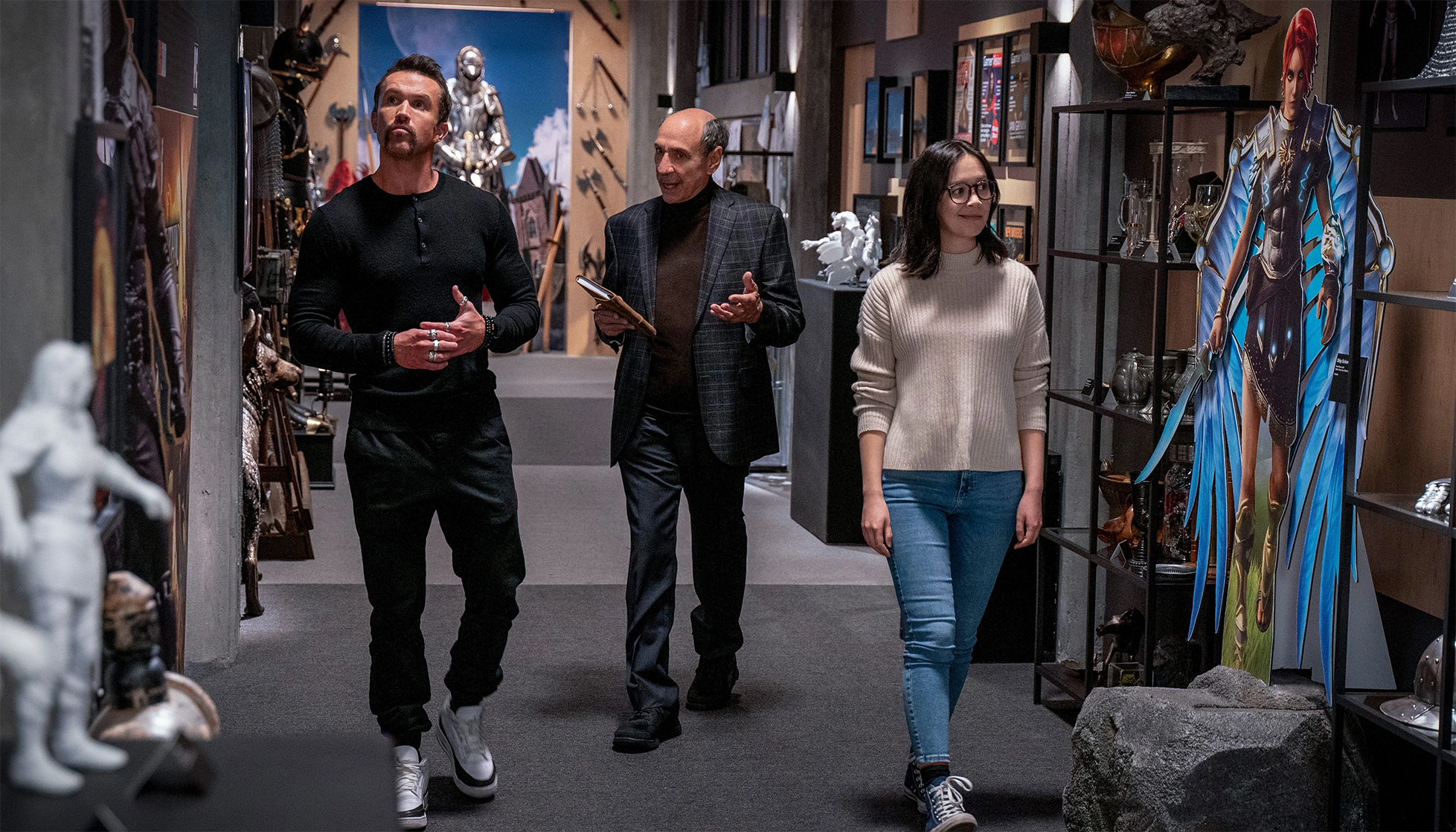
The second season finale breaks up this family. Brad engineers his own arrest by the Federal Bureau of Investigation for insider trading, ending his white collar career at the company. Ian and Poppy decide that they have reached the limits of what they can do within the company and decide to branch out on their own. “I feel like our whole family is falling apart,” complains David Brittlesbee (David Hornsby), the company’s put-upon executive producer.
By the start of season 3 of Mythic Quest, Ian and Poppy have broken away from their old home. They have launched a new company, “GrimPop,” which operates from a few floors below their old office in the same building. David has been left managing Mythic Quest (the game) in their absence. When the three reunite in the third season premiere, “Across the Universe,” the dynamic is very much that of old flames awkwardly engaging in conversation around unhealed wounds.
David brags about how well the company is doing. “I know you guys didn’t think I could do it,” he insists. Poppy reassures him, “No. I mean, we literally haven’t said your name in a year.” When Ian tries to articulate how he feels when he thinks about David, David cycles through a host of emotions including “jealousy,” “rage,” “sad,” and “wistful.” David is clearly still wounded. “You guys were just dragging us down,” he explains. Later, he presses, “You guys have it all figured out, doncha?”
Naturally, the characters reconnect following the news of Longbottom’s passing. David even walks them to the elevator. “You know, it was actually kinda nice seeing you again,” Ian admits. “Yeah, it was,” David concedes, timidly. “Maybe… maybe do it more often?” Poppy awkwardly responds, “Yeah. Yeah, maybe we will.” By the season’s second episode, “Partners,” traffic is moving freely between the two floors, like a single family split across two living areas.
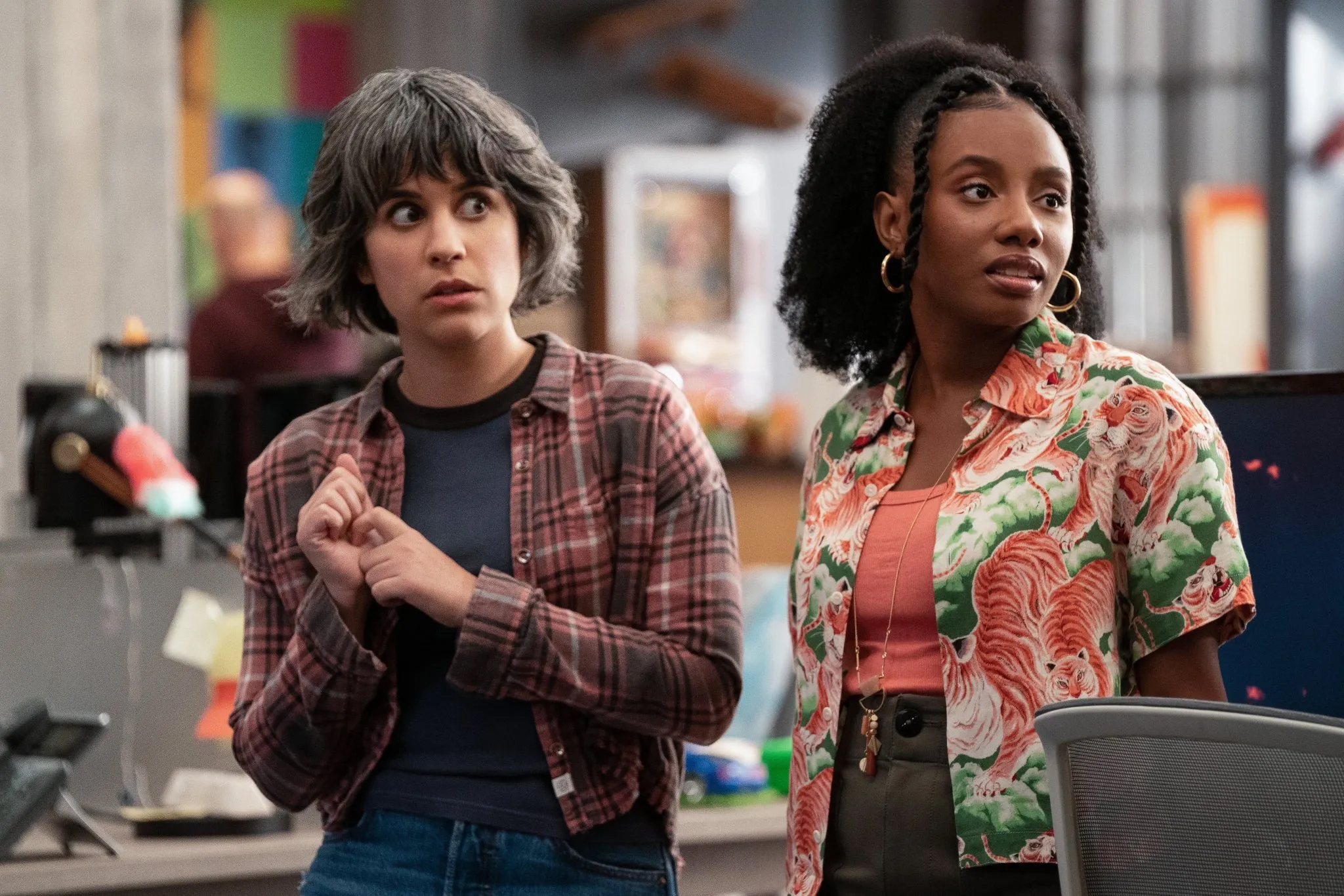
This separation metaphor doesn’t just apply to the two rival companies. When Brad is paroled, he finds employment as a janitor. There is a charged dynamic between Brad and his former assistant, Jo (Jessie Ennis). Brad had taught Jo a lot. He had inspired her to follow her own ruthless impulses and believed that, when he was done, she would “grow from (his) protégé into (his) sworn enemy” and would “try to devour (him).” Jo ultimately broke from Brad and aligned herself with David.
In “Partners,” David assigns Jo to figure out what Brad is planning. The former mentor and mentee have a moment in a company bathroom, each staring into a separate mirror at the basins. Brad reassures Jo that whatever relationship they had is over. “We’re no longer sharks or mice, Jo,” he states. “We’re just two flawed humans looking to make an honest start.” There’s an awkward moment as Jo hands him back the cleaning fluid. She blushes. “I… have to go.”
There’s a similar charged dynamic to the relationship between Ian and Poppy. Although they eventually bring Dana into the company, the gigantic GrimPop studio is shared between the two of them. Their partnership is framed as something of a marriage, albeit one that is not romantic or sexual. Forced into proximity with one another, with no buffer between them, Ian and Poppy have to find a way to work together as partners.
It’s fraught. As Poppy obsesses over code, Ian tries to care for Poppy. She finds his concern irritating. He frets over her diet, her appearance, her health. Introducing a smoothie station and an exercise bike, he tells her, “I’ve got a plan to completely shift your nutritional paradigm.” Poppy has effectively founded a new company with the Peloton Guy. It’s tough for Ian, who has always been somewhat selfish and self-aggrandizing. It’s tough for Poppy, who has always been self-reliant.
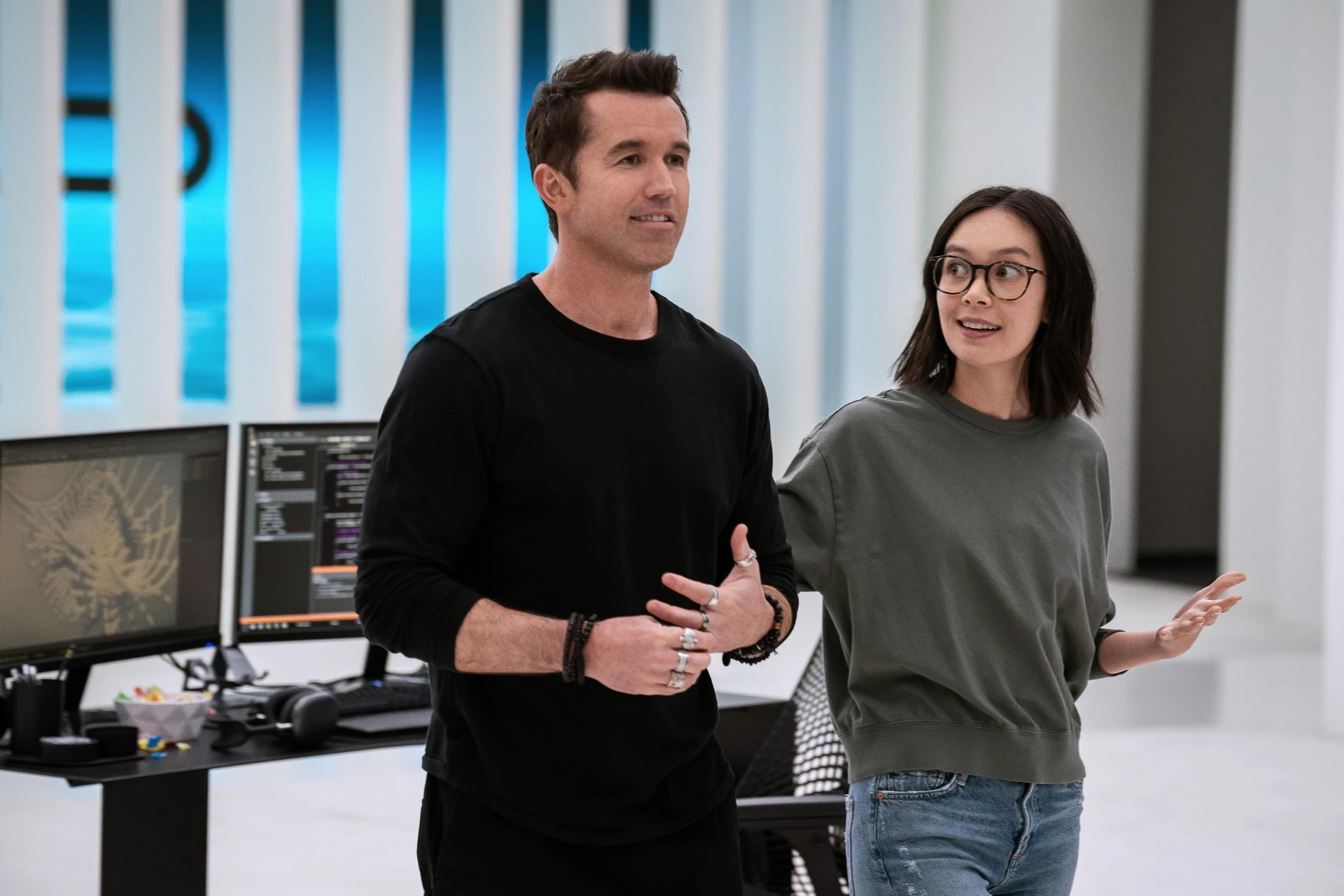
“Leave me alone!” Poppy screams in frustration at the start of “Partners.” Later in the episode, Ian protests, “You gotta let me do my thing!” It is a creative partnership, but it’s also recognizable as a sitcom romance. Ian is trying to be a good work husband, and Poppy is trying to find the right balance in the relationship. In the season’s third episode, “Crushing It,” Poppy is thrown into a crisis of confidence when Ian doesn’t text her back after she accomplishes a significant coding milestone.
This is all classic sitcom stuff. Part of the joy of the sitcom format is throwing cast members together in unlikely combinations, in ways that reveal character. Plenty of sitcoms are built upon the romantic tension between male and female leads, the classic “will they / won’t they?” dynamic that applied to Sam (Ted Danson) and Diane (Shelley Long) on Cheers, Ross (David Schwimmer) and Rachel (Jennifer Aniston) on Friends, and Maddie (Cybill Shepherd) and David (Bruce Willis) on Moonlighting.
Mythic Quest has its share of traditional romances. Dana and Rachel are dating. However, the show is more frequently defined by its dysfunctional relationships. David is largely defined by his divorce from his unnamed ex-wife. Ian has both an ex-wife, Shannon (Alanna Ubach), and son, Pootie Shoe (Elisha Henig). Many of these relationships are navigated through the art that they create, with Ian confronting his own son within the virtual world of Mythic Quest during the first season.
In the world of Mythic Quest (the show), even romantic relationships trend towards creative partnerships. The standout episode of the first season, “A Dark Quiet Death,” focuses on a husband (Jake Johnson) and wife (Cristin Milioti) team whose marriage grows and collapses with their development of the eponymous game. Personal and professional lives are tangled up in one another and cannot be conveniently separated. There is no clean break between collaboration and partnership.
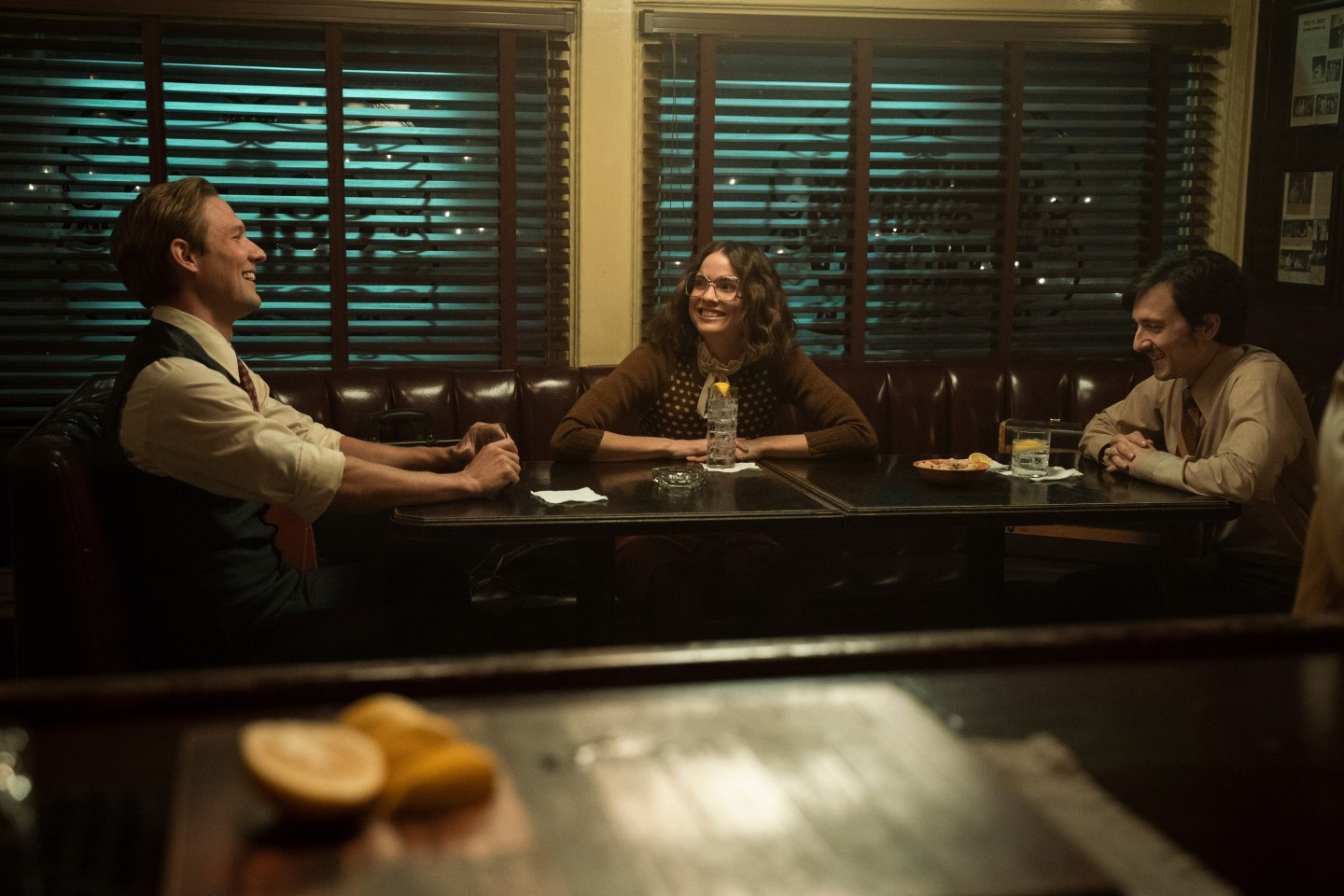
The second season builds its own standout episode, “Backstory!,” around a younger version of Longbottom (Josh Brener). As a science fiction writer, Longbottom strikes up a relationship with A. E. Goldsmith (Shelley Hennig) and Peter Cromwell (Michael Cassidy). Their friendship grows their collaborations, critiquing and encouraging others’ work. Longbottom cannot accept the criticism, breaking the friendship. Goldsmith and Cromwell end up together; Longbottom ends up alone.
In the following episode, “Peter,” an older version of Longbottom and Cromwell (William Hurt) reconnect following Goldsmith’s death. Their bitterness is both personal and professional. Each sees the other as a mediocre talent, but they also fight over their complicated relationship to Goldsmith. When Cromwell admits that he is dying, the two reconcile. Longbottom reads an unpublished draft of the final book in Cromwell’s saga. “I’ve always been a fan,” he confesses, and the rift heels.
Very few of the central relationships in Mythic Quest are conventionally romantic. Ian and Poppy have no desire or need to consummate their partnership in any physical sense. Neither do Brad and Jo, or David and GrimPop. However, these dysfunctional dynamics are recognizable within the standard language of television sitcoms, analogous to old-fashioned romantic tension: marriage and divorce, partners and exes.
The beauty of Mythic Quest lies in how the show uses these tropes and conventions of the genre to underscore its own central themes. It allows the show to be a relaxing comfort watch that hits all the expected beats of a classic sitcom while offering something a little richer beneath the surface dynamics. If creation is a collaborative process, then the relationships that fuel that process are worth exploring — even when they are dysfunctional.

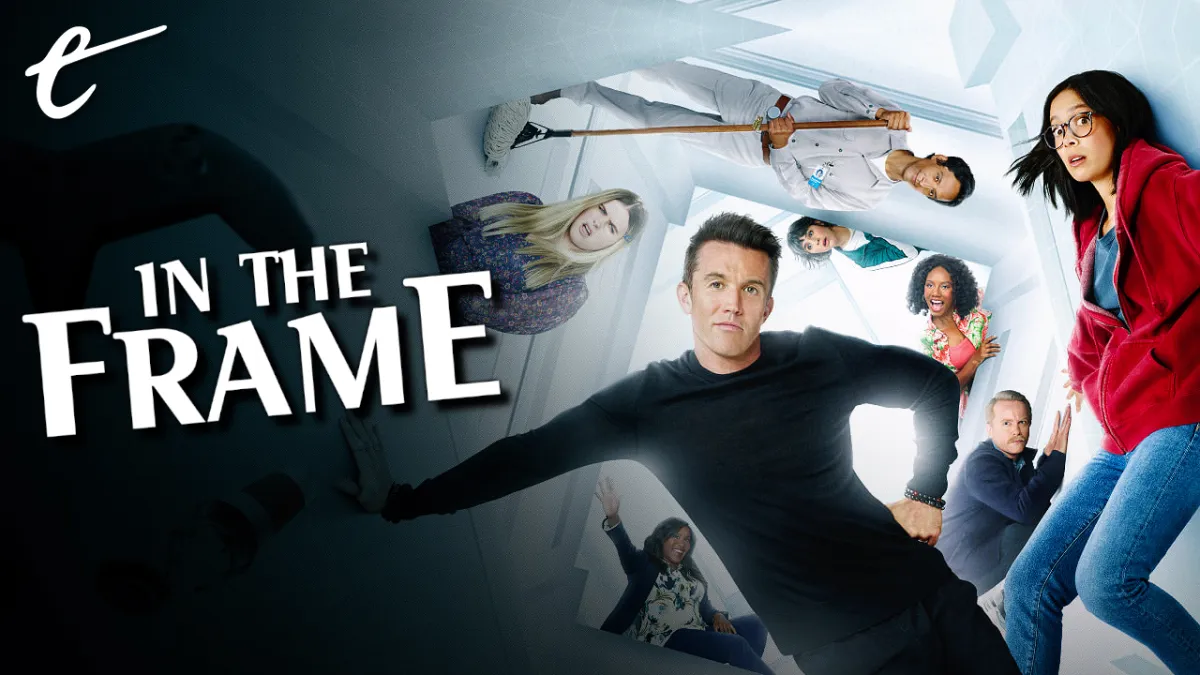




Published: Nov 18, 2022 11:00 am